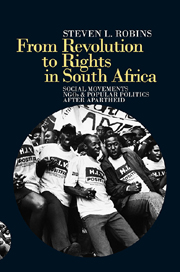 From Revolution to Rights in South Africa
From Revolution to Rights in South Africa Book contents
- Frontmatter
- Contents
- Foreword & Acknowledgements
- Abbreviations
- Zapiro cartoons
- 1 Introduction
- 2 Activist Mediations of ‘Rights’ & Indigeneous Identity
- 3 Citizens & ‘Bushmen’
- 4 ‘Civil Society’ & Popular Politics in the Postcolony
- 5 AIDS, Science & the Making of a Social Movement
- 6 Rights Passages from ‘Near Death’ to ‘New Life’
- 7 Sexual Rights & Sexual Cultures
- 8 Conclusion
- Bibliography
- Index
Foreword & Acknowledgements
Published online by Cambridge University Press: 05 April 2013
- Frontmatter
- Contents
- Foreword & Acknowledgements
- Abbreviations
- Zapiro cartoons
- 1 Introduction
- 2 Activist Mediations of ‘Rights’ & Indigeneous Identity
- 3 Citizens & ‘Bushmen’
- 4 ‘Civil Society’ & Popular Politics in the Postcolony
- 5 AIDS, Science & the Making of a Social Movement
- 6 Rights Passages from ‘Near Death’ to ‘New Life’
- 7 Sexual Rights & Sexual Cultures
- 8 Conclusion
- Bibliography
- Index
Summary
During the years from 1990 to 1992 I lived in Sengezane village in Gwaranyemba Communal Area in Zimbabwe's Gwanda District in Matabeleland. At the time I was busy doing my doctoral fieldwork on village-level politics of land resettlement and rural development. Quite early on during my fieldwork I visited Zimbabwe's capital city Harare with the intention of conveying to Dr Joseph Made, then a senior manager in the Agricultural Rural Development Authority (ARDA), some of the seething problems I had encountered at ARDA's ‘Model D’ resettlement scheme in Sengezane village. In good faith, and in retrospect rather naively, I thought that I could convince the ARDA manager to change the top-down, technicist implementation of extremely disruptive land-use planning interventions in Sengezane village. I had seen first hand how these land-use plans had caused havoc with villagers' daily lives and livelihood practices. I had hardly begun to outline the kinds of village-level complications and hardships these plans had unleashed, when Dr Made launched into a tirade against foreign researchers who criticised his government without providing solutions. By the time I left this volatile meeting I had reconciled myself to the reality that my research findings would have no impact, and that Robert Mugabe's ZANU-PF government was not interested in criticism. I was relieved to know that, once I finished my fieldwork, I could return to South Africa to make a contribution to my country's new democracy.
- Type
- Chapter
- Information
- From Revolution to Rights in South AfricaSocial Movements, NGOs and Popular Politics After Apartheid, pp. vii - xPublisher: Boydell & BrewerPrint publication year: 2008


